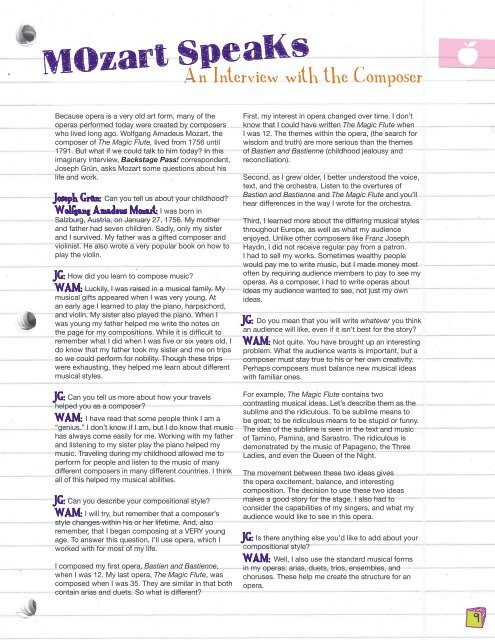Create successful ePaper yourself
Turn your PDF publications into a flip-book with our unique Google optimized e-Paper software.
Because opera is a very old art form, many <strong>of</strong> the<br />
operas performed today were created by composers<br />
who lived long ago. Wolfgang Amadeus Mozart, the<br />
composer <strong>of</strong> The Magic Flute, lived from 1756 until<br />
1791. But what if we could talk to him today? In this<br />
imaginary interview, Backstage Pass! correspondent,<br />
Joseph Grün, asks Mozart some questions about his<br />
life and work.<br />
Joseph Grün: Can you tell us about your childhood?<br />
Wolfgang Amadeus Mozart: I was born in<br />
Salzburg, Austria, on January 27, 1756. My mother<br />
and father had seven children. Sadly, only my sister<br />
and I survived. My father was a gifted composer and<br />
violinist. He also wrote a very popular book on how to<br />
play the violin.<br />
JG: How did you learn to compose music?<br />
WAM: Luckily, I was raised in a musical family. My<br />
musical gifts appeared when I was very young. At<br />
an early age I learned to play the piano, harpsichord,<br />
and violin. My sister also played the piano. When I<br />
was young my father helped me write the notes on<br />
the page for my compositions. While it is difficult to<br />
remember what I did when I was five or six years old, I<br />
do know that my father took my sister and me on trips<br />
so we could perform for nobility. Though these trips<br />
were exhausting, they helped me learn about different<br />
musical styles.<br />
JG: Can you tell us more about how your travels<br />
helped you as a composer?<br />
WAM: I have read that some people think I am a<br />
“genius.” I don’t know if I am, but I do know that music<br />
has always come easily for me. Working with my father<br />
and listening to my sister play the piano helped my<br />
music. Traveling during my childhood allowed me to<br />
perform for people and listen to the music <strong>of</strong> many<br />
different composers in many different countries. I think<br />
all <strong>of</strong> this helped my musical abilities.<br />
JG: Can you describe your compositional style?<br />
WAM: I will try, but remember that a composer’s<br />
style changes within his or her lifetime. And, also<br />
remember, that I began composing at a VERY young<br />
age. To answer this question, I’ll use opera, which I<br />
worked with for most <strong>of</strong> my life.<br />
I composed my first opera, Bastien and Bastienne,<br />
when I was 12. My last opera, The Magic Flute, was<br />
composed when I was 35. They are similar in that both<br />
contain arias and duets. So what is different?<br />
An Interview with the Composer<br />
First, my interest in opera changed over time. I don’t<br />
know that I could have written The Magic Flute when<br />
I was 12. The themes within the opera, (the search for<br />
wisdom and truth) are more serious than the themes<br />
<strong>of</strong> Bastien and Bastienne (childhood jealousy and<br />
reconciliation).<br />
Second, as I grew older, I better understood the voice,<br />
text, and the orchestra. Listen to the overtures <strong>of</strong><br />
Bastien and Bastienne and The Magic Flute and you’ll<br />
hear differences in the way I wrote for the orchestra.<br />
Third, I learned more about the differing musical styles<br />
throughout Europe, as well as what my audience<br />
enjoyed. Unlike other composers like Franz Joseph<br />
Haydn, I did not receive regular pay from a patron.<br />
I had to sell my works. Sometimes wealthy people<br />
would pay me to write music, but I made money most<br />
<strong>of</strong>ten by requiring audience members to pay to see my<br />
operas. As a composer, I had to write operas about<br />
ideas my audience wanted to see, not just my own<br />
ideas.<br />
JG: Do you mean that you will write whatever you think<br />
an audience will like, even if it isn’t best for the story?<br />
WAM: Not quite. You have brought up an interesting<br />
problem. What the audience wants is important, but a<br />
composer must stay true to his or her own creativity.<br />
Perhaps composers must balance new musical ideas<br />
with familiar ones.<br />
For example, The Magic Flute contains two<br />
contrasting musical ideas. Let’s describe them as the<br />
sublime and the ridiculous. To be sublime means to<br />
be great; to be ridiculous means to be stupid or funny.<br />
The idea <strong>of</strong> the sublime is seen in the text and music<br />
<strong>of</strong> Tamino, Pamina, and Sarastro. The ridiculous is<br />
demonstrated by the music <strong>of</strong> Papageno, the Three<br />
Ladies, and even the Queen <strong>of</strong> the Night.<br />
The movement between these two ideas gives<br />
the opera excitement, balance, and interesting<br />
composition. The decision to use these two ideas<br />
makes a good story for the stage. I also had to<br />
consider the capabilities <strong>of</strong> my singers, and what my<br />
audience would like to see in this opera.<br />
JG: Is there anything else you’d like to add about your<br />
compositional style?<br />
WAM: Well, I also use the standard musical forms<br />
in my operas: arias, duets, trios, ensembles, and<br />
choruses. These help me create the structure for an<br />
opera.<br />
9




